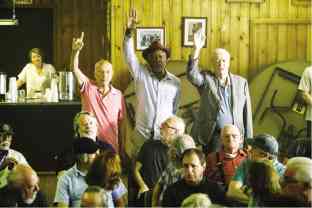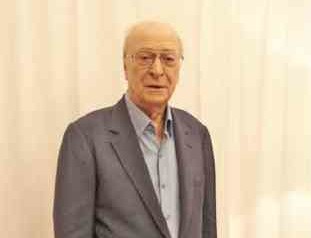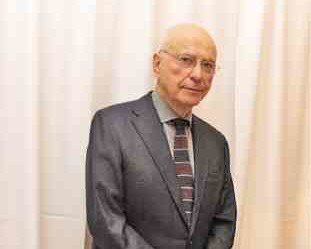(Conclusion)
LOS ANGELES—In part one of this column on not quite grumpy old men, I featured no less than the voice of God, Morgan Freeman. In this part two, my subjects—Michael Caine and Alan Arkin—are equally rich in the breadth of their experience.
When they share an anecdote about “Orson,” that means no less than “Citizen Kane” director, Orson Welles. When “Annie” is mentioned, that’s Ann-Margret, mind you.
Like Morgan, Michael and Alan are effortless in their delivery of wisecracks. Excerpts from our very enjoyable talk:
Michael Caine
You and Shakira have been married for 44 years. What is the secret of your long and happy marriage? The secret is separate bathrooms (laughs). Never share a bathroom with a woman, gents. Because you wind up with a little space only for a razor and a toothbrush. Everything else is covered.
You have advised other actors to put on mascara for their scenes. Do you still put on mascara? Oh, yeah. I was blonde. I had blonde eyelashes. My eyelashes are always dyed—even today. If you appear in a movie with blonde eyelashes, which looks like no eyelashes, no matter what you’re playing, you look like a serial killer (laughs). It’s true.
How do you want your eulogy to go? My own eulogy? “See you later—no hurry (laughs).”
Alan Arkin
They say the older people get, the crankier they become. Well, I am (laughs).
What are the benefits of being older? I’m waiting to find out (laughs). The only benefit I can think of is I can’t hear things very well anymore—and I’m enjoying that immensely.
You and Morgan play roommates and buddies. Did you spend some time together to bond for the movie? We got engaged (laughs). No, we just “acted.” We didn’t spend a lot of time together.
Orson Welles apparently tried to buy the rights to “Catch-22” so he could direct it. Instead, Mike Nichols got to direct the film adaptation. Welles had to make do with playing Gen. Dreedle. Is it true that when Welles came on the set, he tried to take over? I told him (Orson) to go to hell (laughs). I wasn’t taking orders from him.
Did you revere him at the time? No. He made a good movie (“Citizen Kane”).
You were not in awe of him. I’ve been in awe of a lot of people. I was in awe of Orson’s girth and loudness. But the people I have been in awe of and would have swept the floor for were Jean Renoir and Federico Fellini. Not Orson Welles. Sorry.
Do you remember the moment that you decided to become an actor? I do. When I was 5 years old, I asked my father if he could keep a secret. He said, “Yeah.” So I said, “I’m going to be an actor when I get big.” And I didn’t change my mind until recently (laughs).
You’re a prolific book author, as well. I’ve published 10 books, most of them children’s books. There’s a Young Adult (book). A couple of memoirs. I don’t consider myself a writer. Writing to me is like having a boil. Once in a while, I have a boil that needs to be lanced (laughs). And it comes out in words.
In this movie, you have a great sex life with Ann-Margret’s character. I improvised that (laughs).
When you are lying in bed with Ann-Margret, what was your conversation like when the camera wasn’t rolling? We talked about her husband (actor Roger Smith) a lot (laughs). We’re very comfortable with each other. But not in that way.
She allows me to call her Annie, but nobody else is allowed. She’s completely different from her screen or stage persona. I wouldn’t call her strait-laced, but she’s very old fashioned. She’s been married for 50 years. She’s an incredibly devoted wife.
I remember the first film I did with her. If somebody cursed, she left the room. She’s not going to be around for that. So her persona as the sex kitten—that’s left onscreen.
It’s not what she’s like at all in real life. That doesn’t mean she’s boring in any way.
So you had to be the sex kitten on the set. Yeah, that’s just my fate (laughs). It’s always my fate.
What was your reaction when you learned that you’d play a man being pursued by Ann-Margret? I was slightly depressed (laughs) but I got over it. No, I was thrilled. In fact, they asked me about how I felt about her doing the part, and I was wildly excited.
One of my favorite things to do is to work with people again. I don’t feel like I ever really get to know anybody until I’ve worked with them on an entire experience. Because people can change through the course of that experience.
So, working with her again was joyous.
Am I correct that the biggest hit of The Tarriers, the vocal group you were a part of, was “The Banana Boat Song”? Yeah. When that came out, we got sued by Harry Belafonte. But it got laughed out of court. Because the truth came out which is, we both stole it from the same place.
It was a Jamaican folk song. He got it from there, and that’s where we got it, too. So we were both, not thieves, but musicologists (laughs). Or folklorists.
Is there an inner bank robber in you? No, there’s been a couple of insurance people I’d have been happy to hire a hit man over, having been taken over the coals by them. But I can’t rob a bank.
Is getting older something that scares you? We’re all getting older every moment. We’re older now than we were when I said that (laughs). Getting older doesn’t [scare] me; being incapacitated scares me a little.
I feel like meditation has prepared me for it, to a certain extent, because I’m comfortable in not talking a lot. I’m comfortable in not listening a lot, because I’m half deaf.
Being incapacitated—not being able to communicate with somebody else—scares me a little. Dying scares me a little, but not to the extent that it did before because, as a result of meditating for 50 years, I feel like I have a feeling of a self that is more expanded than just this bunch of flesh. So it doesn’t frighten me as much as it used to.
E-mail rvnepales_5585@yahoo.com. Follow him at https://twitter.com/nepalesruben.




